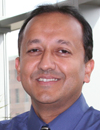Rashid Bashir,
Professor And Head,
University Of Illinois
Rashid Bashir received his Ph.D. degree from Purdue University, West Lafayette, IN, in 1992. From 1992 to 1998, he was a Senior Engineering Manager with the Analog/Mixed Signal Process Technology Development Group, National Semiconductor. Then he joined the faculty at Purdue University from 1998 to 2007. He was the recipient of the NSF Faculty Early Career Award in 2000, the Ruth and Joel Spira Outstanding Teaching Award from Purdue University in 2000, and was a Purdue University Faculty Scholar from 2005–2007. Since October 2007, he has been the Abel Bliss Professor and in the Department of Bioengineering, and Electrical and Computer Engineering at University of Illinois at Urbana–Champaign, where he was also the Director of the Micro and Nanotechnology Laboratory (a campus-wide clean room facility). Since 2013, he has been the Head Department of Bioengineering. He has authored or coauthored over 190 journal papers, over 180 conference papers and conference abstracts, and over 100 invited talks and is the holder of 37 patents. His research interests include bionanotechnology, biomicroelectromechanical systems, laboratory on a chip, interfacing biology and engineering from molecular to tissue scale, and applications of semiconductor fabrication to biomedical engineering, all applied to solve biomedical problems. He was the recipient of the 2012 IEEE EMBS Technical Achievement Award. He is a Fellow of IEEE, APS, AIMBE, IAMBE, and AAAS.
|

|
|

 Add to Calendar ▼2015-02-09 12:00:002015-02-09 13:00:00Europe/London3D BioFabrication for Biological Machines and Tissue EngineeringSELECTBIOenquiries@selectbiosciences.com
Add to Calendar ▼2015-02-09 12:00:002015-02-09 13:00:00Europe/London3D BioFabrication for Biological Machines and Tissue EngineeringSELECTBIOenquiries@selectbiosciences.com Add to Calendar ▼2015-02-09 00:00:002015-02-10 00:00:00Europe/LondonEmerging Themes and Technologies in Tissue Engineering and BioprintingSELECTBIOenquiries@selectbiosciences.com
Add to Calendar ▼2015-02-09 00:00:002015-02-10 00:00:00Europe/LondonEmerging Themes and Technologies in Tissue Engineering and BioprintingSELECTBIOenquiries@selectbiosciences.com